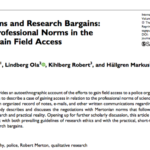 This morning Ola received the news that our paper is available to everyone. The paper is published on an “open access” basis and as a consequence open to anyone! It details the methodological struggles that we have had with one of our projects, and the kind of challenges and opportunities that arose from those – and how we navigated the treacherous waters.
This morning Ola received the news that our paper is available to everyone. The paper is published on an “open access” basis and as a consequence open to anyone! It details the methodological struggles that we have had with one of our projects, and the kind of challenges and opportunities that arose from those – and how we navigated the treacherous waters.
You find the paper here
Abstract
The present study provides an autoethnographic account of the efforts to gain field access to a police organization, spanning more than 2 years. The aim is to describe a case of gaining access in relation to the professional norms of science put forward by Robert K. Merton. Aided by an organized record of notes, e-mails, and other written communications regarding access (144 memos of various types), the study describes and discusses the negotiations with Mertonian norms that followed from the dissonance between ideals of research and practical reality. Opening up for further scholarly discussion, this article concludes that Merton’s norms are incongruent with both prevailing guidelines of research ethics and with the practical, short-term problems of access negotiations and research bargains.
 Today Ola, Robert, Ola and I had the pleasant news that their article “Negotiations and research bargains: Bending professional norms in the effort to gain field access” was accepted for publication in International Journal of Qualitative Methods.
Today Ola, Robert, Ola and I had the pleasant news that their article “Negotiations and research bargains: Bending professional norms in the effort to gain field access” was accepted for publication in International Journal of Qualitative Methods.